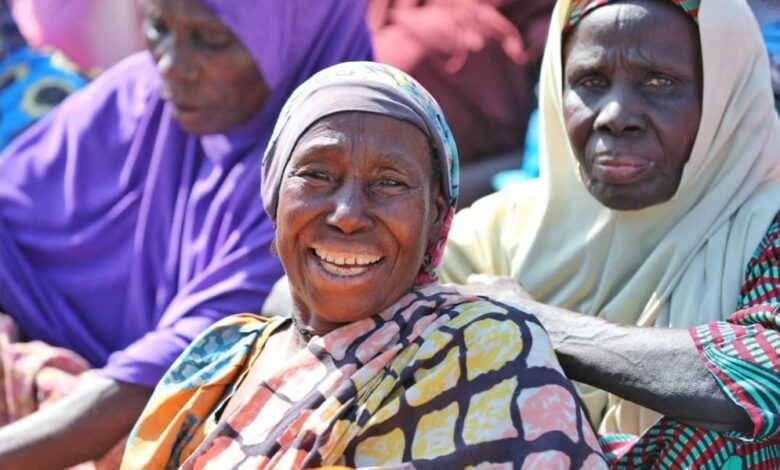15,000 IDPs Return Home 6 Years After Fleeing Borno Border Community
IDPs from Kirawa, a rocky village in Gwoza local government of Borno State, northeast Nigeria, have been helped by the state government to return to their deserted homes after Boko Haram forced them to flee six years ago.

Sixty-year-old Hamsatu Shalva was all smiles as she sat in a row with other women waiting to receive food, clothing, and cash palliative from government officials before returning to her rebuilt home in Kirawa town near the Mandara mountain range in northeast, Nigeria.
It was day two since her arrival at Kirawa, her ancestral home and place of birth which she fled about six years ago after Boko Haram attacked the community.
Hamsatu and her family had been living in an Internally Displaced Persons (IDPs) camp located a couple of kilometres away in Pulka, a town also at the foot of Mandara mountain and close to the border with neighbouring Cameroon.
Nigerian soldiers recaptured the town in March 2015 after a fierce battle with Boko Haram insurgents.
Both Kirawa and Pulka are communities under the Gwoza Local Government Area of southern Borno that were overan at a certain point by the terror group, especially during the peak of insurgency and declaration of an “Islamic caliphate” in mid-2014.
The town had since played host to IDPs who could not flee to as far as Maiduguri, the state capital, or parts of neighbouring Adamawa state.
According to a 2019 report by the humanitarian organisation Médecins Sans Frontières (MSF), Pulka hosted more than 40,000 displaced people, some in camps and others living with the host community.
As the population in the camp soared, livelihood became more of survival of the fittest for many residents. And that made IDPs like Hamsatu crave home every day of their life.
“It is a thing of joy and gratitude to Allah that finally we are back home in Kirawa,” Hamsatu said with heavily accented Hausa, a language widely spoken in the region.
“I know my family had lost everything we used to have that made us comfortable and self-sufficient. No amount of comfort in the IDP camp can be compared with the freedom of being in one’s own home.”
That was the mood on Saturday, June 11, for many of the 15,000 IDPs from 2,500 households that have been resettled to their community as they awaited the Borno State Governor to officially hand them starter packs to pick up pieces of their lives.

Babagana Zulum, the Borno state Governor, travelled to Kirawa to supervise the resettlement of the displaced families into their homes, which officials said: “were rebuilt by the state government.”
“The homes were destroyed by Boko Haram insurgents during their occupation, forcing residents to become internally displaced in Pulka, another town in Gwoza, and to take refuge in neighbouring Cameroon. As a result, Kirawa became deserted for over six years,” Isa Gusa, a spokesman for the governor, said.
Happy Kirawa IDP women. Photo Credit: Borno government Press
The state government had also incentivised the return with a cash largesse of N120 million.
The governor’s spokesman said that apart from food and clothing support the government gave out, each male head of a household was allocated N100,000. At the same time, their wives (some of whom are part of benefiting families) were each given N20,000.
“Additionally, all the 2,500 households each received food items comprising a bag of rice, a bag of maize grill and a wrapper each for female returnees,” he said.
The resettlement is part of an ongoing initiative of the State Government to rehabilitate and repopulate deserted communities. The program has also led to the closure of camps in Maiduguri.
Although the government considers it an essential part of the rebuilding process and facilitating resilience, there are concerns about secondary displacement involving moving displaced persons to camps situated close to their previous hometowns and food insecurity due to limited access to means of livelihood and humanitarian support.
Support Our Journalism
There are millions of ordinary people affected by conflict in Africa whose stories are missing in the mainstream media. HumAngle is determined to tell those challenging and under-reported stories, hoping that the people impacted by these conflicts will find the safety and security they deserve.
To ensure that we continue to provide public service coverage, we have a small favour to ask you. We want you to be part of our journalistic endeavour by contributing a token to us.
Your donation will further promote a robust, free, and independent media.
Donate HereStay Closer To The Stories That Matter




